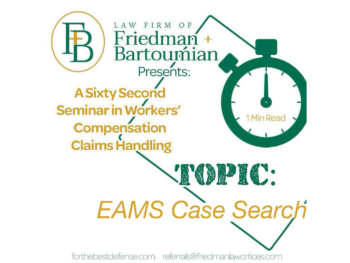Without a doubt, every examiner who handles indemnity claims has at one time or another been asked by a claimant for a lump sum PD advance. While some injured workers ask only for a few hundred dollars, others aren’t shy to ask for far more. The purpose of today’s blog is to offer a few suggestions when issuing lump PD advances as no formal procedures currently exist under law that address this issue.
Each claims department creates their own rules when it comes to issuing a lump sum advance. Some flat out refuse while others limit payment to no more than $1,000. Still others are more liberal and issue multiple lump sum advances with no conditions providing there is sufficient PD money available to cover the payments. We are not about to interfere with how an administrator handles their own internal affairs, but we do offer the following suggestions:
Prior to issuing a lump sum payment, the parties should enter into a written agreement acknowledging that the money being paid represents a PD advance to be credited against indemnity liability at the administrator’s discretion. We also recommend the agreement itself contain the following language:
“The parties hereby agree and stipulate that the sum of ($—-) paid by the claims administrator at the request of the injured worker is a voluntary lump sum PD advance, where at the employer’s discretion credit against this sum may be fully or partially applied at any time against present, past and future TD, PD and/or Death indemnity benefits owed.”
The injured worker must agree to these conditions in writing prior to receiving a lump sum PD advance. Credit against sums advanced may be applied should future indemnity benefits resume or upon settlement of the claim. Not only does the written agreement mitigate future liability but it may also eliminate any penalty entitlement as well.
We at F+B realize that for the most part payment of a lump sum PDA creates good will and often leads to an amicable settlement. However, for the administrator’s protection, any lump sum payment should be conditionally issued pursuant to a written agreement. Our law firm has developed many such legal strategies to protect our clients. We are ready to protect your interests and resolve your claims.


Leave a Reply